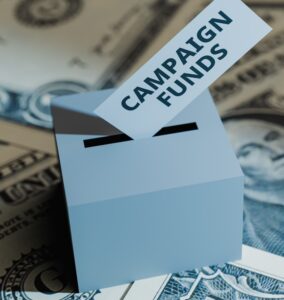
The recent election may be behind us, but it’s never too early to think ahead, especially when it comes to understanding the do’s and don’ts for lawyers with respect to judicial campaign fundraising. In New York, lawyers are allowed to contribute to the reelection campaigns of judges they may appear before, but what happens when lawyers decide to get even more involved? This post discusses the ethical dilemmas and best practices for attorneys who actively support judicial candidates and offers guidance on how lawyers can protect themselves.
The Issues
Two potential ethical pitfalls associated with attorney fundraising for judicial candidates are the perception of impartiality and conflicts of interest.
Perception of Impartiality: Here, the core question is whether lawyers can contribute to campaigns of judges before whom they regularly appear out of concern for possible judicial bias and/or favoritism. The New York Bar and Bench have explicitly addressed this by codifying a carve-out to the ethical rule against improper influencing of the judiciary to allow attorneys to contribute to judicial campaigns.
See N.Y. Rules of Prof. Con. Rule 3.5(a)(1) (“A lawyer shall not seek to or cause another person to influence a judge, official or employee of a tribunal by means prohibited by law or give or lend anything of value to such judge official, or employee of a tribunal when the recipient is prohibited from accepting the gift or loan but a lawyer may make a contribution to the campaign of a candidate for judicial office in conformity with Part 100 of the Rules of the Chief Administrator of the Courts”).
Lawyer fundraising for judicial candidates can raise concerns about judges’ impartiality toward advocates who actively work to get them reelected.
Conflicts of Interest: Lawyers may find themselves in situations where they are advocating for clients before judges they have financially supported. This raises potential ethical implications for judges, which could necessitate disclosing the contribution and fundraising efforts to avoid the conflict. Judges are obligated to disclose any potential conflicts of interest to maintain the judicial system’s integrity and uphold public trust.
This obligation is rooted in ethical guidelines that require judges to avoid any situation where their impartiality might reasonably be questioned. See 22 NYCRR 100.2 (“A judge shall avoid impropriety and the appearance of impropriety in all of the judge’s activities.”); Judicial Ethics Opinion 12-164 (“For two years after the election, a judge must disclose that an attorney appearing in the judge’s court participated in the judge’s prior judicial election campaign . . . .”).
Best Practices
If a lawyer chooses to fundraise for judicial campaigns, they should consider the following best practices to mitigate risks and uphold ethical standards:
Know the Rules: Lawyers should familiarize themselves with the rules governing campaign contributions in their jurisdiction. Many states have specific regulations regarding contributors and the amount they can contribute. Understanding the rules is crucial to avoid any unintentional violations.
The New York State Board of Elections outlines specific regulations regarding contributions and fundraising. Under NYCRR 100.3(E)(1), a judge must recuse him or herself from a proceeding if the judge has a personal bias or prejudice concerning a party.
Separate Advocacy from Fundraising: Ensure fundraising efforts do not interfere with legal practice. Avoid situations where a contribution could be perceived as influencing legal work and the outcome of cases.
Recusal: In some cases, a judge must recuse themselves from a case where an appearing attorney has participated in the judge’s election campaign. The Committee on Judicial Ethics has advised that only active conduct in support of a judicial campaign requires recusal. For example, the committee has concluded that when an attorney organizes a single fundraiser for a judicial candidate, the judge is disqualified and subject to remittal when the attorney appears before the judge during the campaign.
After the election, neither disclosure nor disqualification is required. The committee has also concluded that if the lawyer held leadership positions in the campaign or maintained a fundraising role during the campaign, recusal should extend for two years following the election. See Opinion 03-64.
Conclusion
Lawyers’ fundraising for judicial campaigns has significant implications for the legal profession and the integrity of the judiciary. By approaching judicial campaign fundraising with care and awareness of the ethical implications, lawyers can ethically support candidates committed to upholding the rule of law and serving the public interest.
